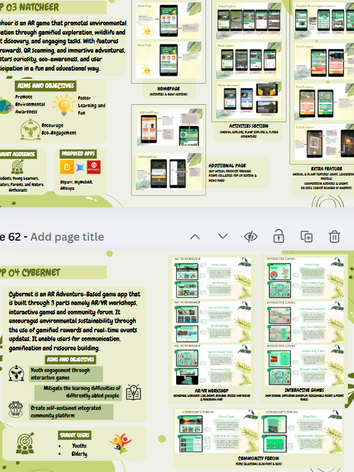
About the Module
The Sustainable Living module opened my eyes to the idea that sustainability goes beyond just conservation; it encompasses a wider view that includes ethical consumption and responsible resource management. These insights really resonated with me, and I began to keep the goals of the project in mind. I became more aware of my impact on the planet, from how much energy I use to what I eat. Our discussions on the circular economy emphasized the importance of recycling, remanufacturing, and reusing products, along with fundamental concepts related to sustainability. This is why the module also stressed the role of community and policy in promoting sustainable practices. I’m particularly interested in cities that implement green infrastructure or zero-waste initiatives, as I believe these are essential goals for society that require a significant shift in current practices. I found it refreshing to see these practices being carried out sustainably. Listening to the challenges faced by developing countries in balancing economic growth with environmental care brought up important issues of climate injustice for me. This holistic approach made me realize how crucial it is to find solutions that are both locally relevant and fair. In summary, the module underscored the significance of social responsibility and proactive engagement. Additionally, it emphasized the need for practical changes, such as integrating eco-friendly habits into everyday life and supporting environmentally friendly initiatives. Personally, these insights will influence my life and career as I strive to contribute to a cleaner and more equitable world. This experience has deepened my understanding of the complexities and urgency surrounding sustainability issues.

Project 1 :
SUSTAINABILITY ASSESMENT OF COMPARATIVE STUDIES
The Sustainable Living module opened my eyes to the idea that sustainability goes beyond just conservation; it encompasses a wider view that includes ethical consumption and responsible resource management. These insights really resonated with me, and I began to keep the goals of the project in mind. I became more aware of my impact on the planet, from how much energy I use to what I eat.
Our discussions on the circular economy emphasized the importance of recycling, remanufacturing, and reusing products, along with fundamental concepts related to sustainability. This is why the module also stressed the role of community and policy in promoting sustainable practices. I’m particularly interested in cities that implement green infrastructure or zero-waste initiatives, as I believe these are essential goals for society that require a significant shift in current practices. I found it refreshing to see these practices being carried out sustainably.
Listening to the challenges faced by developing countries in balancing economic growth with environmental care brought up important issues of climate injustice for me. This holistic approach made me realize how crucial it is to find solutions that are both locally relevant and fair. In summary, the module underscored the significance of social responsibility and proactive engagement. Additionally, it emphasized the need for practical changes, such as integrating eco-friendly habits into everyday life and supporting environmentally friendly initiatives. Personally, these insights will influence my life and career as I strive to contribute to a cleaner and more equitable world. This experience has deepened my understanding of the complexities and urgency surrounding sustainability issues.






The mixed group and individual assignment, *Providing Innovation Solutions for Biodiversity Awareness and Community Engagement*, offered a valuable opportunity to blend creativity, teamwork, and analytical thinking. Focused on creating solutions to enhance biodiversity awareness and promote community involvement at Taman Tasik Cyberjaya, the project emphasized the need to balance environmental priorities with community engagement.
As a team, we worked together to assess the site's unique biodiversity, identify its challenges, and explore potential community-driven initiatives. This involved collaborative brainstorming sessions, site visits, and discussions to ensure our proposed solutions were both practical and impactful. The group dynamic fostered a variety of perspectives, enriching our solutions, which included interactive educational trails, programs for preserving native species, and eco-volunteer initiatives.
On an individual level, the project required us to reflect and conduct research to refine and support our proposed ideas. This aspect pushed us to independently consider the broader implications of the project while aligning with the team's vision. The assignment highlighted the importance of innovation in tackling real-world environmental issues and the role of community engagement as a catalyst for change.
Overall, it deepened our understanding of how collaborative and individual efforts can work together to achieve meaningful, sustainable results. The experience enhanced our resilience in problem-solving and creativity in advocating for biodiversity.












